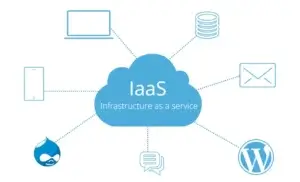Cloud service provider is projected to thrive in the coming years, which comes as no surprise given the rapid growth of the technology sector. Today, cloud adoption is no longer limited to large enterprises, small and medium-sized businesses (SMBs) are also leveraging the cloud to improve efficiency and scalability.
According to Statista, the global public cloud computing market is expected to reach approximately US$ 723.42 billion by 2025. This growth is driven by comprehensive solutions offered by cloud service providers, ranging from business process services, platforms, infrastructure, software, and management tools to advanced security systems.
What is a Cloud Service Provider?

Cloud computing has become a fundamental necessity in the digital transformation era, helping businesses innovate more easily. Cloud services offer advantages such as flexibility, resilience, security, and scalability.
Cloud Service Provider (CSP) is a company that delivers computing services over the internet. Instead of purchasing and maintaining their own servers, businesses can rent services like data storage, processing power, applications, and development tools from CSPs.
These services are typically flexible, allowing businesses to scale their usage up or down depending on their current needs.
Key Factors When Choosing a Cloud Service Provider

Since cloud services are highly adaptable to business needs, it is crucial to choose a provider that aligns with your specific requirements. Here are essential factors to consider:
1. Technological Capabilities
Evaluate the technology the provider offers. Are they committed to delivering the latest innovations? Review their service portfolio to determine if their solutions are suitable for your business needs and whether they demonstrate continuous growth and innovation.
2. Company Profile and Pricing
Ensure the provider fits your business strategy. Check their track record, customer reviews, and experience in the industry. Look for transparent, flexible pricing models such as pay-as-you-go or long-term commitment discounts without binding contracts.
3. Security Certifications and Regulatory Compliance
CSPs should comply with industry standards and best practices, demonstrated through certifications such as DMTF, RDS CAL, PCI DSS, and ISO 27001. Choose providers with proven data protection measures, including regular backups and compliance with national and international regulations.
4. Partnerships and Integrations
Check whether the provider has established partnerships with other vendors or technology platforms. Broad partnerships often enable CSPs to offer enhanced services and access to the latest innovations.
5. Performance Monitoring
Your role doesn’t end after selecting a CSP. Make sure they provide monitoring and reporting systems. Evaluate the provider’s performance over a 6–12 month period against the promised Service Level Agreements (SLAs).
Types of Cloud Services

CSPs offer various service models tailored to different operational needs. The three most common approaches are:
Infrastructure as a Service (IaaS)
Offers foundational digital infrastructure such as servers, storage, and networking. Ideal for companies seeking full control over their IT environment with the cost-efficiency of usage-based billing.
Platform as a Service (PaaS)
Provides ready-to-use platforms for developing, testing, and deploying applications without managing hardware or operating systems. This accelerates innovation and time-to-market.
Software as a Service (SaaS)
Delivers easy access to cloud-based applications via the internet without local installations. SaaS is a popular choice due to its flexibility, minimal upfront investment, and fully managed services.
Added Value of Using a Cloud Service Provider
One key driver of cloud adoption in Indonesia is the widespread use of mobile devices and social media. This trend encourages public and private organizations to digitize and engage more effectively with customers online.
Digital transformation and IT modernization are essential steps for businesses to remain competitive. Cloud Service Providers like Google Cloud Platform (GCP) offer robust solutions that support this journey.
Smartnet Magna Global (SMG), a member of CTI Group and a subholding of PT Anabatic Technologies Tbk, delivers GCP-based cloud solutions to support evolving technology needs.
Anabatic is a leading public IT company in Indonesia, we provide advanced tech solutions to meet complex business demands. Through its subholdings, it promotes digital transformation across industries.
Key Benefits of Google Cloud Platform (GCP):
High Scalability and Security
GCP allows businesses to scale computing resources up or down based on demand. Its multi-layered security infrastructure ensures robust data protection, so businesses can operate with confidence.
AI and Data Analytics Innovation
GCP provides advanced computing power to help businesses leverage artificial intelligence (AI) and data analytics for faster, data-driven decision-making and operational efficiency.
Operational Efficiency
GCP reduces the need for physical infrastructure management. This frees up IT teams to focus on strategic initiatives like application development, system integration, and digital innovation, rather than hardware maintenance or scalability issues.
Maximize Business Growth with the Right Cloud Service Provider

Cloud computing continues to evolve with diverse service models and simplified access, giving companies the freedom to choose solutions that best fit their operations and scale.
By moving away from complex physical infrastructure, businesses can concentrate on innovation and boosting competitiveness.
Adopting cloud platforms like GCP not only increases operational efficiency but also opens doors to transformative technologies such as data analytics and AI, accelerating decision-making and driving long-term, sustainable growth in the digital age.
Read Also:
- Enhancing Security Efficiency Through the Internet of Things
- Securing Personal Data with Identity and Access Management
- Improving Operational Security with Business Continuity & Disaster Recovery
- Optimizing Customer Interaction with Voicebot in Customer Service
- Empowering Digital Change Through Infrastructure as a Service
























